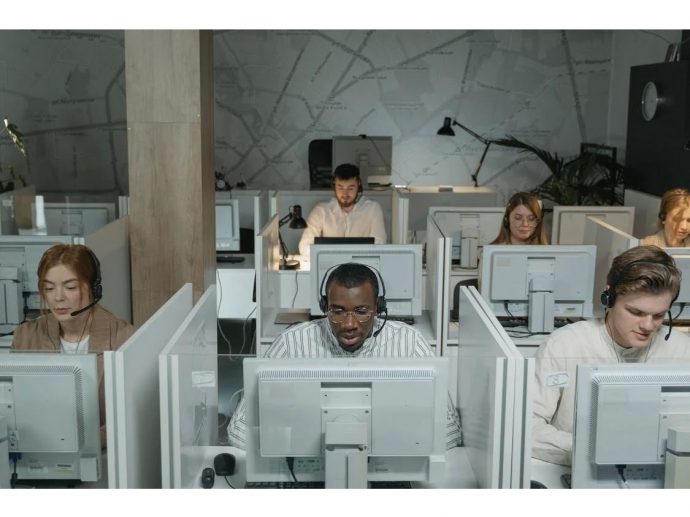Categories more
- Adventures (16)
- Arts / Collectables (14)
- Automotive (36)
- Aviation (10)
- Bath, Body, & Health (73)
- Children (6)
- Cigars / Spirits (30)
- Cuisine (16)
- Design/Architecture (17)
- Electronics (12)
- Entertainment (4)
- Event Planning (3)
- Fashion (43)
- Finance (8)
- Gifts / Misc (6)
- Home Decor (44)
- Jewelry (39)
- Pets (3)
- Philanthropy (1)
- Real Estate (11)
- Services (21)
- Sports / Golf (14)
- Vacation / Travel (60)
- Watches / Pens (14)
- Wines / Vines (24)
- Yachting / Boating (15)
Privacy and Noise Reduction: Key Features of Call Center Cubicles
Published
07/17/2024In the bustling environment of a call center, maintaining a balance between privacy and noise reduction is essential for ensuring employee productivity and satisfaction. Effective call center office cubicles must address these two critical factors to create a conducive work environment. This article explores the key features of call center cubicles designed to enhance privacy and reduce noise, ultimately contributing to a more efficient and comfortable workspace.
The Importance of Privacy and Noise Reduction
Privacy and noise reduction are crucial for several reasons:
- Confidentiality: Call centers often handle sensitive customer information. Ensuring that conversations remain private helps maintain customer trust and complies with data protection regulations.
- Focus: Reducing noise distractions allows employees to concentrate better on their tasks, leading to higher productivity and fewer errors.
- Employee Well-being: A work environment that supports privacy and minimizes noise contributes to reduced stress levels and improved job satisfaction.
Key Features for Privacy in Call Center Cubicles
- High-Partition Walls: High partitions or privacy panels help shield employees from the view of their colleagues, providing a sense of personal space. These partitions can be designed to extend from the floor to a reasonable height, ensuring that employees feel separated from their surroundings.
- Adjustable Privacy Screens: Adjustable privacy screens offer flexible solutions for individual privacy needs. These screens can be repositioned or folded away as needed, allowing employees to control their level of visual privacy while accommodating varying workspace requirements.
- Acoustic Panels: Acoustic panels, often installed on walls or partitions, absorb sound and prevent it from traveling between cubicles. These panels are essential for creating a quieter environment and reducing the potential for overhearing private conversations.
- Soundproofing Materials: Cubicles can be constructed using soundproofing materials, such as dense fabrics or specialized acoustic tiles, to further enhance privacy. These materials help block sound from penetrating the cubicle walls, ensuring that conversations remain confidential.
- Enclosed Workspaces: For roles requiring higher levels of privacy, fully enclosed cubicles or office pods can be implemented. These spaces are designed with solid walls and doors to provide complete visual and auditory isolation, ideal for handling sensitive information or conducting private discussions.
Key Features for Noise Reduction in Call Center Cubicles
- Soft Furnishings: Incorporating soft furnishings, such as cushioned seating and upholstered partitions, can help absorb sound and reduce echo within the cubicle. Soft surfaces are effective at dampening noise and creating a more pleasant auditory environment.
- Noise-Canceling Technology: Providing employees with noise-canceling headphones or earplugs can help them focus and reduce the impact of background noise. This technology allows employees to concentrate on their tasks without being disturbed by the surrounding environment.
- Strategic Layouts: Arranging cubicles in a layout that minimizes direct line-of-sight between workstations can help reduce noise transmission. Creating buffer zones with shared spaces or collaborative areas can also mitigate noise levels and improve overall acoustics.
- White Noise Machines: White noise machines can be strategically placed in the office to mask background sounds and create a consistent acoustic environment. These machines help drown out distracting noises and improve focus.
- Soundproof Doors and Windows: Installing soundproof doors and windows can further enhance noise reduction within the cubicles. These features help prevent external sounds from entering the workspace and maintain a quieter atmosphere.
Benefits of Privacy and Noise Reduction Features
- Enhanced Employee Focus: By reducing noise and improving privacy, employees can concentrate better on their tasks, leading to increased productivity and efficiency. A quieter, more private work environment helps employees stay engaged and perform at their best.
- Improved Confidentiality: Effective privacy solutions ensure that sensitive information remains secure and confidential. This is crucial for maintaining customer trust and complying with data protection standards.
- Reduced Stress and Distractions: A well-designed workspace that addresses privacy and noise reduction can significantly reduce stress levels and minimize distractions. Employees are more likely to feel comfortable and satisfied in an environment where they can work without constant interruptions.
- Increased Job Satisfaction: Providing a workspace that supports both privacy and noise reduction contributes to overall job satisfaction. Employees appreciate having a comfortable and secure environment, which can enhance morale and reduce turnover rates.
Conclusion
Privacy and noise reduction are fundamental aspects of effective call center cubicle design. By incorporating features such as high-partition walls, acoustic panels, and noise-canceling technology, call centers can create workspaces that support employee focus, confidentiality, and well-being. Addressing these needs not only improves productivity and job satisfaction but also contributes to a more professional and efficient work environment. As call centers continue to evolve, investing in thoughtful cubicle design will remain essential for fostering a successful and harmonious workplace.















